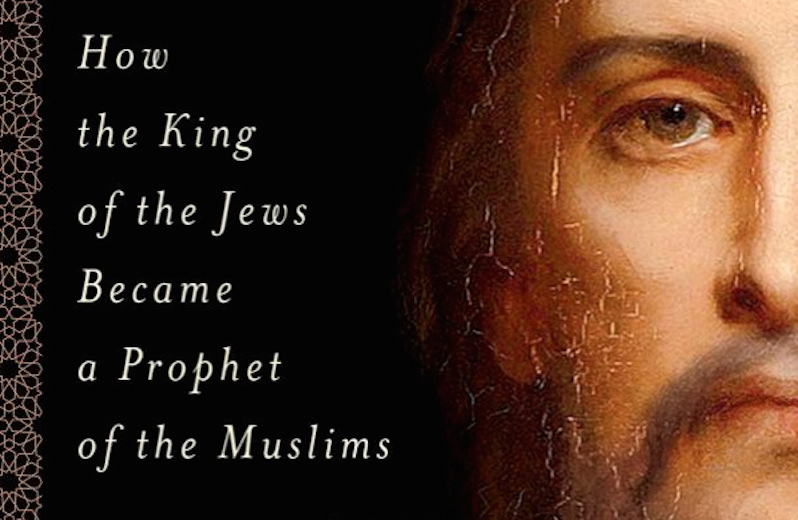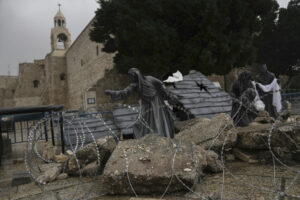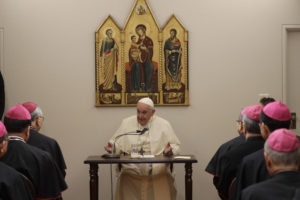The Islamic Jesus
Mustafa Akyol's book tells Christians, Muslims and Jews exactly what we all have in common and how we got this way. It reaches us not a minute too soon. A fragment of the cover of "The Islamic Jesus: How the King of the Jews Became a Prophet of the Muslims." (St. Martin's Press)
A fragment of the cover of "The Islamic Jesus: How the King of the Jews Became a Prophet of the Muslims." (St. Martin's Press)
“The Islamic Jesus: How the King of the Jews Became a Prophet of the Muslims”
A book by Mustafa Akyol
Mustafa Akyol, a columnist for, among other publications, the International New York Times, and author of “Islam Without Extremes,” has written “The Islamic Jesus: How the King of the Jews Became a Prophet of the Muslims” — a book that tells Christians, Muslims and Jews exactly what we all have in common and how we got this way. It reaches us not a minute too soon.
“As a faithful Muslim,” Akyol writes early on, “and thus a believer in the all-compassionate God, the god of Abraham — I found much of the Christian scripture quite appealing and inspiring.” The roadblock for Akyol, as with all Muslims, is the Christian belief in the divinity of Jesus. “To my Muslim mind, Jesus as a messenger of God was a very familiar, appealing theme. But Jesus as God was anathema.”

Purchase in the Truthdig Bazaar
When his friends were asked to read a passage from the New Testament, he says, “This is very similar to the Qur’an,” and “Are you sure this is from the Christian Bible?” The passage that elicits these reactions is the Epistle of James; the part of the New Testament that Muslims cannot accept comes from St. Paul. Akyol quotes biblical scholar James D. Tabor: “There are two completely separate and distinct Christianities embedded in the New Testament. One is quite familiar and became the version of the Christian faith known to billions. … Its main proponent was the apostle Paul.” The other is championed by “None other than James, the brother of Jesus.”
But though Muslims cannot accept the writings of Paul, “even when one does not share the theology of Christianity, one can appreciate its moral teachings on modesty, compassion, and forgiveness.” The Quran, Akyol points out, refers to Christians as al-Nasara, or “helpers” of Jesus and God. Both faiths share a reverence for Mary, the mother of Jesus. (She is the only woman mentioned by name in the Muslim holy book, in which she appears 34 times compared with 19 times in the New Testament. Jesus himself is mentioned in 93 verses of the Quran.)
To see long excerpts from “The Islamic Jesus” at Google Books, click here.
Finnish biblical scholar Heikki Raisanen, who died in 2015, felt that “The Qur’anic portrait of Jesus is not so remote from the New Testament as might seem to be the case at first glance.” The late theologian Geoffrey Parrinder wrote that “Jesus is always spoken of in the Qur’an with reverence; there is no breath of criticism, for he is the Christ of God.”
The unbridgeable gap comes from what Christians call the Holy Trinity: the manifestation of God as the Father, the Son and the Holy Ghost, particularly as it pertains to Jesus. Simply put, Muslims cannot understand or accept what Christians mean when they call Jesus the son of God. As the Quran states, “Those who say that God is the third of three” — emphasis Akyol’s — “are unbelievers. There is no god but One God.”
Muslims do accept Jesus as the Messiah, but not in the same sense that Christians do, which is “Jesus was not God, but rather a servant of God.”
Akyol, of course, is not the first historian to trace the roots of Islam in Jewish theology — he cites a judgment by German theologian Adolf von Harnack that “Islam is a transformation of the Jewish religion already transformed by the gnostic Jewish-Christians on Arabic soil.” The Jewish Christians that Harnack referred to are the disciples of Jesus’ brother James, who was regarded as the leader of Jewish Christians. By the fifth century, the teachings of Paul became pervasive, and led to “Gentile Christians,” as Akyol calls them, whose break with Judaism “made Christianity the universalist religion that it is today.” By the end of the fifth century, Jewish Christians “had already vanished from history” — though their influence lived on in the Quran. That is why many students of early Christianity identified Paul as “the first Christian.”
One of Akyol’s genuine contributions is making clear that much of what we call religious differences over the centuries has its origin in politics, which “led to bitter conflicts between the expanding Muslim empires and Christian states — and to the latter’s counterattack, the Crusades.” Today, he says, “We need more irja, or religious tolerance, both among Muslims themselves, and between Muslims and adherents of other faiths.”
Akyol is careful to maintain that “The Islamic Jesus” “is not meant to be a critique of, let alone an attack on, Christianity. It is just an effort to highlight a view of Jesus that is somewhat different from the one that lies at the heart of Christians’ faith.”
More than anything Akyol leaves us all with a sense that there exists a large body of common ground:
Your support matters…“As Muslims … we have disagreements with both Jews and Christians. But we have major agreements as well. With Jews, we agree a lot on God. With Christians, we agree that Jesus was born of a virgin, that he was a Messiah, and that he is the Word of God. Surely, we do not worship Jesus, like Christians do. Yet still, we can follow him. In fact, given our grim malaise and his shining wisdom, we need to follow him.”
Independent journalism is under threat and overshadowed by heavily funded mainstream media.
You can help level the playing field. Become a member.
Your tax-deductible contribution keeps us digging beneath the headlines to give you thought-provoking, investigative reporting and analysis that unearths what's really happening- without compromise.
Give today to support our courageous, independent journalists.






You need to be a supporter to comment.
There are currently no responses to this article.
Be the first to respond.